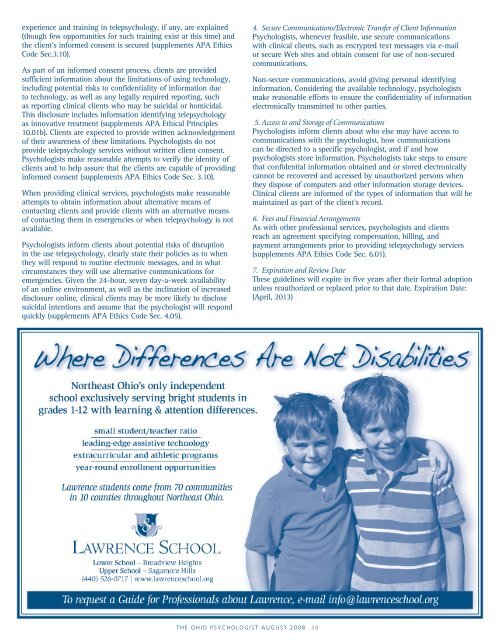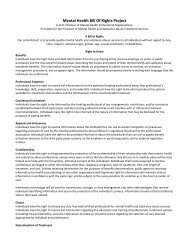2008 Ohio Psychologist - Ohio Psychological Association
2008 Ohio Psychologist - Ohio Psychological Association
2008 Ohio Psychologist - Ohio Psychological Association
Create successful ePaper yourself
Turn your PDF publications into a flip-book with our unique Google optimized e-Paper software.
experience and training in telepsychology, if any, are explained<br />
(though few opportunities for such training exist at this time) and<br />
the client’s informed consent is secured (supplements APA Ethics<br />
Code Sec.3.10).<br />
As part of an informed consent process, clients are provided<br />
sufficient information about the limitations of using technology,<br />
including potential risks to confidentiality of information due<br />
to technology, as well as any legally required reporting, such<br />
as reporting clinical clients who may be suicidal or homicidal.<br />
This disclosure includes information identifying telepsychology<br />
as innovative treatment (supplements APA Ethical Principles<br />
10.01b). Clients are expected to provide written acknowledgement<br />
of their awareness of these limitations. <strong>Psychologist</strong>s do not<br />
provide telepsychology services without written client consent.<br />
<strong>Psychologist</strong>s make reasonable attempts to verify the identity of<br />
clients and to help assure that the clients are capable of providing<br />
informed consent (supplements APA Ethics Code Sec. 3.10).<br />
When providing clinical services, psychologists make reasonable<br />
attempts to obtain information about alternative means of<br />
contacting clients and provide clients with an alternative means<br />
of contacting them in emergencies or when telepsychology is not<br />
available.<br />
<strong>Psychologist</strong>s inform clients about potential risks of disruption<br />
in the use telepsychology, clearly state their policies as to when<br />
they will respond to routine electronic messages, and in what<br />
circumstances they will use alternative communications for<br />
emergencies. Given the 24-hour, seven day-a-week availability<br />
of an online environment, as well as the inclination of increased<br />
disclosure online, clinical clients may be more likely to disclose<br />
suicidal intentions and assume that the psychologist will respond<br />
quickly (supplements APA Ethics Code Sec. 4.05).<br />
4. Secure Communications/Electronic Transfer of Client Information<br />
<strong>Psychologist</strong>s, whenever feasible, use secure communications<br />
with clinical clients, such as encrypted text messages via e-mail<br />
or secure Web sites and obtain consent for use of non-secured<br />
communications.<br />
Non-secure communications, avoid giving personal identifying<br />
information. Considering the available technology, psychologists<br />
make reasonable efforts to ensure the confidentiality of information<br />
electronically transmitted to other parties.<br />
5. Access to and Storage of Communications<br />
<strong>Psychologist</strong>s inform clients about who else may have access to<br />
communications with the psychologist, how communications<br />
can be directed to a specific psychologist, and if and how<br />
psychologists store information. <strong>Psychologist</strong>s take steps to ensure<br />
that confidential information obtained and or stored electronically<br />
cannot be recovered and accessed by unauthorized persons when<br />
they dispose of computers and other information storage devices.<br />
Clinical clients are informed of the types of information that will be<br />
maintained as part of the client’s record.<br />
6. Fees and Financial Arrangements<br />
As with other professional services, psychologists and clients<br />
reach an agreement specifying compensation, billing, and<br />
payment arrangements prior to providing telepsychology services<br />
(supplements APA Ethics Code Sec. 6.01).<br />
7. Expiration and Review Date<br />
These guidelines will expire in five years after their formal adoption<br />
unless reauthorized or replaced prior to that date. Expiration Date:<br />
(April, 2013)<br />
THE OHIO PSYCHOLOGIST AUGUST <strong>2008</strong> 38











